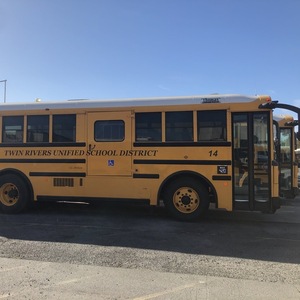Neste: School district fuels 75 buses with renewable diesel

SOURCE: Neste
October 5, 2020
BY Neste
The Twin Rivers Unified School District near Sacramento achieved a major milestone in its climate action plan by switching 75 diesel-powered school buses to run on renewable diesel fuel provided by Neste. As a result, the district’s fleet is now fully fossil free and one of the cleanest in the country. Because Neste MY Renewable Diesel is a drop-in fuel, Twin Rivers was able to achieve this remarkable milestone practically overnight.
“Yesterday, our fleet of diesel-powered school buses were contributing to air pollution and climate change,” said Timothy Shannon, Twin Rivers USD director of transportation. “Now, they are helping fight these two big problems. All it took for us to start creating a healthier, more sustainable future for the children and communities served by Twin Rivers was to switch from fossil to renewable diesel – probably one of the easiest decisions we’ve ever had to make.”
Twin Rivers USD, the 28th largest school district in California with 26,000 students, has been on a journey to “green” its school bus fleet. Last year, the school district started using electric buses. Now, by simply changing fuel types, Twin Rivers will realize an 80 percent reduction in lifecycle greenhouse gas emissions from its remaining fleet of diesel-powered buses.
Advertisement
Advertisement
Neste, its distributor Van De Pol Petroleum and Twin Rivers established a long-term contract to fuel all of the diesel-powered school buses with Neste MY Renewable Diesel. Importantly, switching to renewable diesel did not cost the school district – or tax payers – anything extra. Alongside the environmental benefits, Twin Rivers can also expect to see superior performance and reduced maintenance costs.
“Renewable diesel can not only accelerate the phase out of fossil fuels, it also enables us to create a circular economy,” said Carrie Song, Neste’s Vice President of Renewable Road Transport Americas. “Going forward, it would be great for Neste and Twin Rivers to take our partnership to the next level by using the school district’s waste to produce the renewable diesel for its buses.”
Under normal circumstances in California, more than 25,000 school buses bring millions of students to school each day. About 65% of these vehicles run on fossil diesel – contributing to climate change and potentially exposing children to toxic emissions. Unique amongst low- and zero-emission solutions, renewable diesel fuel offers school districts a way to immediately, affordably and easily change this. In fact, simply switching the state’s entire fleet of diesel-powered school buses to run on renewable diesel fuel could reduce greenhouse gas emissions by nearly 600 million pounds per year - the same climate benefits as building nearly 60 wind farms, planting 4.5 million trees, or keeping more than 26.5 million gallons of oil in the ground per year.
Neste’s renewable diesel fuel is made from renewable and sustainably sourced waste materials – such as used cooking oil, rendered fats and grease. These wastes come from hotels, restaurants, sports stadiums and many other venues with industrial kitchens. By collecting and converting these wastes into renewable products, Neste is creating a closed loop system that can help accelerate society’s transition away from fossil fuels.
Advertisement
Advertisement
To further enhance the environmental benefits of its renewable products, Neste has set an ambitious target to make its production operations carbon neutral by 2035. Additionally, Neste is researching and developing a new generation of raw materials which would allow for greater greenhouse gas savings - including municipal solid waste, forestry waste, and even converting power to liquids.
Related Stories
The U.S. Department of Energy’s Office of Energy Efficiency and Renewable Energy is soliciting public comments on a preliminary plan for determining provisional emissions rates (PER) for the purposes of the 45Z clean fuel production credit.
On July 17, Iowa’s cost-share Renewable Fuels Infrastructure Program awarded $1.12 million in grants for 20 applicants to add B11 and 4 applicants to add E15 to retail sites. This was the first meeting following the start of RFIP’s fiscal year.
Par Pacific Holdings Inc., Mitsubishi Corp. and ENEOS Corp. on July 21 announced the signing of definitive agreements to establish Hawaii Renewables LLC, a joint venture to produce renewable fuels at Par Pacific’s refinery in Kapolei Hawaii.
A new study published by the ABFA finds that the U.S. EPA’s proposal to cut the RIN by 50% for fuels made from foreign feedstocks, as part of its 2026 and 2027 RVOs, could stall the growth of the biomass-based diesel (BBD) industry.
The European Commission on July 18 announced its investigation into biodiesel imports from China is now complete and did not confirm the existence of fraud. The commission will take action, however, to address some systemic weaknesses it identified.
Upcoming Events










